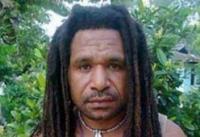By Amy McQuire - The Indonesian security forces have been accused of the murder of another pro-independence West Papuan leader. Amy McQuire reports.
A West Papuan pro-independence activist has been found dead less than a week after he went missing in the lead-up to Indonesian President Susilo Bambang Yudhoyono's visit to the region.
The body of Martinus Yohame was found in a sack floating in the sea near the city of Sorong, West Papua on August 26. He went missing on August 20. Yohame was head of the local Sorong branch of the pro-independence group the West Papua National Committee (KNPB).
Amnesty International said the disappearance had coincided with the detention of another political activist just prior to President Yudhoyono's attendance at a sailing event in Sorong.
Yohame had reportedly staged a press conference in Sorong the day before he disappeared, opposing the President's visit and raising the issue of illegal logging.
The KNPB were reportedly planning demonstrations, including the raising of the banned "Morning Star" flag, an act which has seen activists jailed by the Indonesian government.
Amnesty International has condemned Indonesia, saying the attack "highlights the repressive environment faced by political activists and journalists in the area and the rights violations by the security forces there".
It also follows the arrest of two school students earlier this month for painting pro-independence graffiti.
Robert Yelemaken, 16 and Oni Wea, 21, were reportedly beaten by the arresting police officers.
Amnesty International reports they were forced to roll in dirty water and drink paint.
Yelemaken has been released but Wea is still incarcerated and facing charges of "incitement".
The fate of two French journalists who were arrested earlier this month whilst allegedly in the company of separatists is also uncertain.
They may be charged with espionage, despite the international Reporters Without Borders stressing they were in West Papua to report on the economic and social problems faced by Indigenous people under Indonesian rule.
International journalists are prohibited from reporting in West Papua, and local journalists are intimidated from reporting on independence sentiment.
Amnesty International called on the President-elect Joki Widodo to ensure freedom of expression in the country, by amending the Criminal Code to bring it in line with the UN International Covenant on Civil and Political Rights, and Indonesia's own Constitution.
Human Rights Watch has also called on the incoming President to release political prisoners and allow human rights organisations access to the region.
"In Papua, the failure of Indonesia's security forces to distinguish between violent acts and peaceful protests has contributed to rising tensions and insecurity in the province," a statement from Human Rights Watch said.
"Human Rights Watch urged Widodo to order the immediate and unconditional release of everyone imprisoned for the peaceful exercising of their political views, and to permit foreign journalists and human rights organizations unimpeded access to the province."
Indonesia has had control over the province since
the withdrawal of the Dutch in the 60s, and the passing of the controversial "Act of Free
Choice" in 1969.

